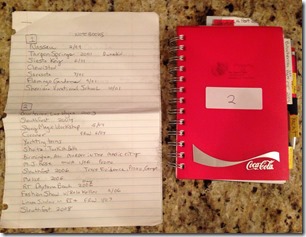Your experiences and travels provide fodder for future works and should be recorded. When I wrote travel journals years ago, little did I realize that I’d be mining those notes decades later for my Drift Lords series. I’d been to Hong Kong in 1978. Yet today, many of the sights, sounds, and sensory impressions remain the same. Thus I sought my notes for Warrior Rogue, where a scene takes place in that great city. Ditto for the other locations around the globe for my paranormal series—Los Angeles, Tivoli Gardens in Copenhagen, and Arizona. You never know when a bit of research will come in handy.
I’ve been journaling my travels ever since I can remember. And I never related this talent to my father’s writing ability until I edited his 1929 true life travel adventure titled Thumbs Up. Who knew this is where my drive to write everything down came from? Thanks, Dad. And from my mother came the attention to detail. She described every scene in a way that made me more observant.
And now, for my latest Bad Hair Day mystery, I’ve turned again to my notes. Years ago, I accepted an invitation to go backstage at a fashion show to observe the goings-on. In particular, I took note of the hairdressers and their role in prepping the models. I used all this info in a chapter I just completed for my current WIP.
How did I find this material? I write my observations, travel journals and on-location research notes in various small notebooks. I use colored tabs to divide the sections. Then I sticker them with a number and detail the contents on a separate list. Conference notes, on-scene research and experiences that may someday be relevant to my work go into these journals. So this time, I looked on my list and saw Fashion Show under number two. I pulled out this notebook and there they were: copious notes that would prove highly useful for my scene in progress.
Here’s an excerpt:
Marla had brought four stylists plus herself for eight models. She’d let her staff do the actual work while she supervised. She had supplied each of them with Luxor products specifically for this event. The fashion designer had sent pictures of each woman ahead of time so her staff could consult on the look. Yolanda wanted a sleek, elegant appearance to go with her gowns.
In another corner, the makeup artist was laying out her cosmetics. Each model would head over there for a touch-up once her hair was done.
Marla glanced at the racks of gauzy, glittering dresses, wishing she had time to examine each gown and drool over the creations. Sparkling burgundy, bright yellow, sexy black, tropical turquoise, sublime coral, chocolate and lime stood out in satins, silks and chiffons along with sequins, seed pearls and intricate beading. A separate rack held a dazzling array of wedding gowns. Who else but a wealthy socialite could afford these outfits? Each one cost thousands of dollars. With a sigh, Marla realized this was the closest she’d ever get to high society.
Yolanda bustled about, greeting each person and keeping her tote box at hand. What was in there? Needle and thread for last minute repairs? Jewels to go with her gowns?
“Thirty minutes per person, ladies,” Yolanda shouted. “That’s the goal.”
Marla winced. That wouldn’t give them much iron time. “The guests have to eat dinner yet. It’s still relatively early.”
“Our show starts before the entrée course to get people in the mood for dancing. We have to get the models through makeup and into their gowns by eight-thirty at the latest.”
“How many changes does each girl have to make?”
Yolanda pursed her lips. “The show is divided into four segments, although the bridal procession at the end requires only four models. So some girls will have three changes and some will have four. You’ll have mere seconds between scenes to fix any stray hairs, so make sure your stylists do their jobs right the first time.”
The lesson here is for you to pay attention to your surroundings and experiences. Take notes on ANYTHING that might become useful to your writing. Chronicle your trips and record the sensory impressions along with unusual observations, sights and experiences. Take notes during conference workshops. Then organize the material so you can find it later. Consider it a legacy to pass down to your kids. They might throw out your journals, or they might treasure them like I do my parents’ writings. Never miss an opportunity to record a slice of life.
Do you take random notes when you go places, even if you can foresee no immediate use for them?
<><><>
Don’t forget to visit me over at The Kill Zone, where I blog on alternate Wednesdays. This week my topic is Attending a Writers Conference, very appropriate since I’ll be at the Novelists, Inc. event in St. Pete Beach.
